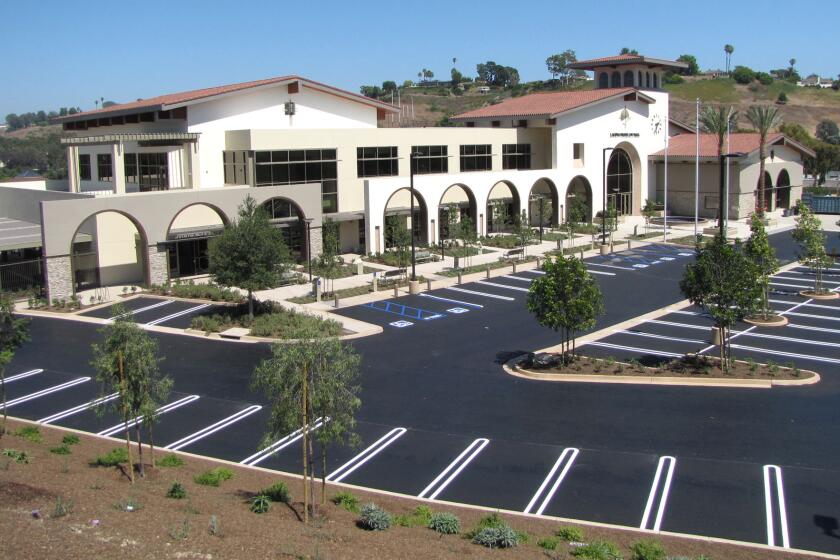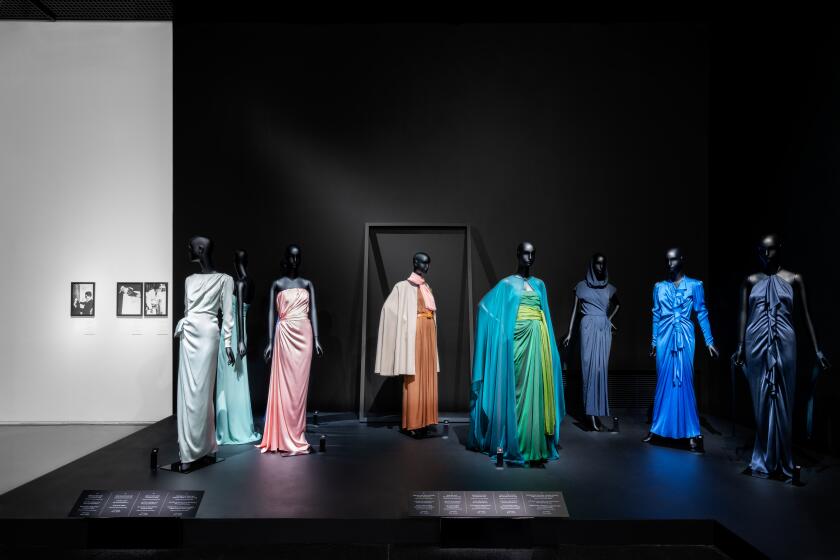Santa Ana artists take on American democracy in online video series
When Victor Payan and Sandra “Pocha” Peña envisioned their performance for “Dreamocracy in America,” they imagined they’d be touring six destinations across the country.
Then COVID-19 happened.
The artist couple and co-founders of Media Arts Santa Ana (MASA) were setting up a show in San Antonio, costumes and all, but decided to head back home to Santa Ana to be close to their elderly parents.
In lieu of live performances, they adjusted “Dreamocracy in America” to be held over Zoom and archived on YouTube.
The idea for the performance art series came from their activist and advocacy work, as they came across Alexis de Tocqueville’s book “Democracy in America.” De Tocqueville, a French aristocrat, initially traveled throughout the U.S. to study prisons during the 1830s. He ended up writing about American politics.
“He really nailed the American character — the strengths and the weaknesses of American society as far as politics and democracy are concerned,” Payan said. “But he only spoke to white, landed men because they were the ones who were in power and could vote. They were the ones who were in charge of that discussion. We’re continuing the conversation for the people who weren’t included in De Tocqueville’s conversations — Latinos, immigrants, the Native community, Asian Americans, African Americans, LGBTQ, Dreamers.”
The series, which started in April, features guests like artist Guillermo Gómez Peña, Culture Clash actor and writer Herbert Siguenza and WorldBeat Cultural Center director Makeda Dread.
“We wanted to focus on people that were doing innovative things with their practice, in engaging with a governmental bureaucratic system either through policy or the day-to-day reality of communities,” Peña said.
Some of the guests touch on topics relating to COVID-19, whether it’s checking in on how the pandemic is affecting them personally or a collective action like actress and comedian Kristina Wong. She created the Facebook group “Auntie Sewing Squad,” who have distributed more than 55,000 masks to vulnerable communities.
Guests also talk about their work. Dread Scott‘s 1989 conceptual artwork “What is the Proper Way to Display a U.S. Flag?” was the center of national controversy and led to a Supreme Court case ruling that regulating flag desecration was a violation of free speech.
Although the video featuring Scott premiered live on May 22, many of the topics discussed connect to recent protests against racism and the death of George Floyd, as well as pushback against statues and public school mascots embedded in racist history.
In 2019, Scott organized a Slave Rebellion Reenactment in New Orleans reimagining the German Coast Uprising of 1811. Black reenactors dressed in period-specific clothing marched for two days and 26 miles while holding machetes, muskets and flags.
“You can’t understand America if you don’t understand slavery,” said Scott on in the video. “You can’t understand slavery if you don’t understand slave revolts.”

Scott added that in the U.S. there were 250 documented examples of slave revolts involving 10 or more people.
“Putting that vision out there ... it was exploding a lot of myths, but also putting forward a way in which people in the past fought for change and how descendants of Africans and indigenous people can fight for change in the present,” Scott said.
The “Dreamocracy in America” project, funded by a Creative Capital grant award, is set to continue with more Zoom videos in July featuring James Rojas, founder of the Latino Urban Forum advocacy group. They plan to do some work around this year’s election and go on tour at some point in the future when traveling is deemed safe.
Payan and Peña are also switching the rest of MASA’s programming online. The nonprofit, aimed at making media production accessible, offers digital arts classes under the Millennial Producers Academy usually held in the spring. The classes are now available for free on their website. Their O.C. Cinema Camp will also be available online for free during the summer.
“This is a time people could be writing, filming, making music and connecting with a digital audience,” Payan said. “These are important skills they’ll have for work, but they’re no longer limited by whether they have access to a film school or whether they have access to the industry. They can start on their own and really get those skills and develop their own voices.”
Most of the nonprofit’s funding comes from grants and events. Payan said they’ve received enough grant money to still host some of MASA’s festivals.
While the Día Del Niño festival at the O.C. Fair and Event Center was canceled in April, they are putting together videos from some of the original artists and performers booked for the event.
The O.C. Film Fiesta is set to take place in October with a grant from the California Arts Council. They aren’t sure if the festival will be in theaters or online yet. If hosted virtually, festival-goers would be able to view the films online and participate in video Q&A sessions with the directors.
All the latest on Orange County from Orange County.
Get our free TimesOC newsletter.
You may occasionally receive promotional content from the Daily Pilot.




